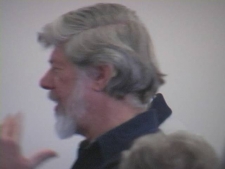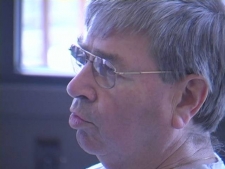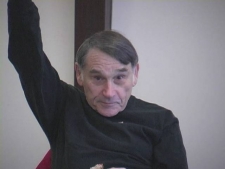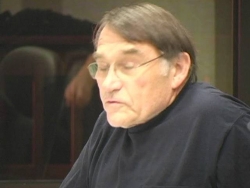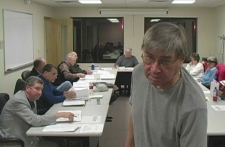We previously wrote about the near-scuffles at the February 23rd Round Table. There’s a discussion of these shouting matches on Bill Master’s website, The Summit Advisor. One of the multiple posters in that thread uses the anonymous ID Guest47.
Guest47’s posts aren’t accurate on the basic facts of what took place at the Round Table. Fraser was not “countering Master’s allegation that the board and committees engage in secret meetings” on the clip, as the poster contended. Fraser’s first outburst occurred after Steve Locke attempted to ask audience-member Masters a few questions in what looked like a scripted event. Fraser’s second outburst occurred after the meeting had concluded. Both of these facts are clear on the video. At one point, Masters did ask a question – not make an allegation – about his concerns that the board was having private discussions, but this question and the response concluded without incident – almost 1 hour after Fraser’s first outburst. Since Guest47 can’t even get basic facts straight, we’re not going to devote a lot of energy to unscrambling his post.
Bill Adams confessed to us that he regularly posted on Master’s website under this exact same anonymous ID, Guest47. The combination of these posts and Adams’ position in the community (he’s Chair of the Buildings and Grounds Committee and serves on the Activities Committee) prompted us to reflect on Adams’ conduct and prior writings.
There is a larger point in scrutinizing the opinions of these individuals, and it’s a point with which the Lake Holiday community desperately needs to come to grips. Lake Holiday has a widespread problem, and it is so damaging the community that if it’s not fixed, it will destroy it. What is it? A lot of people are playing a game of denial.
In his posts, Guest47 complained that Masters is a “constant nuisance” and has a website that serves “the lowest level of intellect whose purpose is to provoke others….” – and then he proceeded to praise Fraser’s conduct. Every reasonable person who watches the Keep It Over Here Punk video (also on our Videos page) will say that the behavior of Locke and Fraser was designed to provoke. But Guest47 denies this reality.
For a period of time Bill Masters allowed Bill Adams to serve as the editor of The Summit Advisor, and as Adams himself stated in October 2005, he wrote “most of the Advisors’ articles.” In that capacity Bill Adams often was highly critical of the conduct of LHCC’s board. Here are a few highlights.
In July 2006 Adams wrote:
Leadership at Lake Holiday has a history of bad decisions.
He went on to list a dozen bad decisions to support his point “in hopes of awaking some determination for improvement.” We calculate that the cost of these bad decisions exceeds millions of dollars.
Just a short time later, we distributed a petition for a special meeting to remove the majority of LHCC’s board, and Bill Adams signed this petition calling for the removal of then President Chris Allison. He added the notation on our form: “Regretably [sic], this action is necessary.” Regarding our petition Bill Adams wrote:
The petition itself does not seek to grant water & sewer expansion to Oqunquit lots at community expense as has been suggested. … The sentiment of the Board and its defendants is that the Ogunquit proposed replacements are pro-expansion and willing to commit community funds ($M’s) to that cause. We do not believe that to be an accurate assessment. While we cannot speak for the individuals (nor should the board) we believe their interest is more toward fixing some inherent problems with the board itself.
Adams supported fixing “inherent problems with board itself.” He saw residents facing a “disproportionate share” of expenses. He continued:
In any new development the Developer would incur the total costs of such amenities (along with roads and infrastructure) and would recover the expense via the sale of lots. Amenities are normally employed to attract buyers to the development. Instead, we the residents are contributing a disproportionate share to these capital improvements such as the clubhouse, gatehouse and bus stop. Ever get the feeling that…(never mind).
The unfinished thought from a person who otherwise has no problem expressing himself is denial taking over. Adams also took up the issue of the Utility sale. A portion of the proceeds from the sale of LHEUC’s assets was in the form of a contingent note stretching out 15 years. Of this contingent stream of payments from Aqua Virginia, Adams wrote:
…the 15 yearly payments of $78k are contingent on an aggressive new connection quota! In a declining housing market, we can probably kiss that $1.17M goodbye. We understand that interim hookup fees are also deducted from the $800k. At $8686* each, if 92 lots are connected, the utility company is a give-away. Free! Some deal!
Both we and Bill Masters have been critical of the collectibility of the contingent payment stream from Aqua and that LHEUC was sold too cheaply. As far back as August 2006, Adams expressed the same criticism – describing it sarcastically as “some deal!” Adams largely stopped his public efforts to foster change; we and Masters have not stopped such efforts because the governance problems that underlie these events remain unfixed. The fix for those unable to face reality: deny the validity of Masters’ points and label him a “constant nuisance.”
In October 2005, after the Court granted our petition to block LHCC from voting its own lots in elections, Adams wrote:
As hopes of passing the documents erodes, the board may be scrambling for ways to keep it alive. One hope may have been the 223 lot votes denied by the court. Was the board intending to use them to pass the documents? We may never know. Another hope might have been that a fair portion of the population would vote for the new documents. Receipt of mail-in votes may have dashed that hope as well. Nobody who I talked to is supporting the documents. With imminent failure at hand, the cancellation of the vote may have been to [sic] only alternative to a major embarrassment.
Adams’ statement that “we may never know” if the Board was intending to vote LHCC-owned lots is more of the denial game. LHCC’s board passed Resolution 2004-8 expressing its intentions in writing. We were not in Court on this issue based on speculation but rather on published statements. Hiding behind vague and inaccurate words is denial. Facing “imminent failure” LHCC canceled the September 2005 vote on new governing documents. Adams continued his criticism of these proposed documents, which he felt were:
…verbose and convoluted rules intended to keep lawyers employed. We could actually go out and enjoy the lake and amenities without worry that we would lose our rights. God forbid we ever need legal interpretation of existing rules like “no clotheslines”. Instead the misery lives on – Postponed until another angle can be contrived.
By May 2006 when substantially the same governing documents re-surfaced for a vote that June, Adams forgot about the “misery” and gave the documents back-handed praise, claiming they were:
more readable than earlier versions, with a nice cover page, uniform margins and paragraph numbering. … Many comparative reviews are possible, e.g.; with the existing documents, with the 40 “Recommended Changes”, and between versions on the revised documents. The feasibility and value of such comparisons is questionable, given the complexity and time frames.
Translation of Adams’ gibberish: The documents look pretty, they’re hard to understand, time is short, but I just can’t bring myself to tell you to approve them. When you have to resort to praising the deed to your property – perhaps your most valuable investment – because it has a nice cover page and uniform margins, you are in denial. Fortunately, thanks in large part to Bill Masters’ efforts to inform the community, approval of these new governing documents failed by a wide margin. To those denial gamers who claim that we are an unpopular lone wolf, pause and reflect: nearly 2 out of every 3 voters who voted against these documents joined with us and voted “No” by our proxy.
At the same time in a post entitled A Development Diary, Adams offered sharp criticism for recent board actions:
Adopting Goldberg’s rules, any unchallenged presidential motion automatically becomes a unanimous board resolution. Totalitarian Democracy is invented. Fearing litigation, the Board refunds all builder conformance fines imposed by the Architectural Committee. A revised Enforcement Guideline is created detailing every conceivable construction infraction and remedy. An ex-board president (who signed the Development Agreement) and a favored Builder are installed by the Board on the Architectural Committee without customary apprenticeship. The third Construction Supervisor and ArchComm liaison in a year quits along with a long standing ArchComm member.
”Totalitarian Democracy.” Those are very strong words to describe a community association. Despite those strong feelings, Adams could not muster the courage to explain that he was the “long standing ArchComm member” who quit over the problems he described. When you distance yourself from your own first-hand experiences, you are in denial.
Like Adams, we’ve been critical of the adoption of Goldberg’s Rules of order. But our website is labeled a “hate site.” People that play the denial game often lash out at those who challenge them to face reality.
Unfortunately, these examples of denial are not limited to Adams. In August 2006 Miller & Smith sent a letter to all property owners, stating in part, “Yes, we have special privileges….” (Our own reply has been posted here for everyone to see since that same time. For another twist on the denial game, review our comments on free water & sewer. As recently as the Saturday 2/23 Round Table, Wayne Poyer was still repeating the free water & sewer lie.) At around the same time former LHCC President Lou Einstman was allowed to post his own answer to Miller & Smith on the front page of The Summit Advisor:
When I left the Board in 2004, there was almost two million dollars in the bank. Today, the treasurer is predicting that we will be broke by September if we can’t get a loan or a line of credit. Where did all that money go? Maybe the changes that Heisey and Allison made in the way business is conducted weren’t so good for the community after all.
Einstman regularly attends board meetings, so he’s in a position to observe board conduct first-hand. On the responsibility of being a board member, Einstman wrote:
This isn’t a social position! Some of the present Board members seem to think that all they have to do is show up for the meetings. They don’t do their homework. They don’t understand the issues nor do they know how they want to vote on them. This irresponsible attitude is very discouraging.
Others have been similarly critical of board conduct. Former LHCC employee LeeAnn Stevens revealed that board members came to her asking for explanations of what went on in the boardroom or complaining that actions were taken without discussion. Both Einstman’s and Stevens’ sharp words parallel the criticism that both we and Masters have leveled at the board.
Our Silent Sitter award is certainly more colorful, but it is a legitimate attempt to draw attention to the very same problem that caught Einstman’s attention over 1 year earlier – but remains unaddressed. To those put off by our Silent Sitter award, take note: Einstman’s modest caution failed to correct the problem. In the spring of 2007, months before introducing the Silent Sitter award, we called Lou Einstman and asked to meet to discuss solutions to these and other problems. He declined our request. Instead of acknowledging our shared observation, Einstman’s response is to tell the critics to stop complaining and “get out.”
We’ve documented that Einstman supported the election of Rick Bleck, who did not meet the 1 year ownership requirement for nomination set forth in LHCC’s bylaws and was invisible on the campaign trail but was elected anyway. Bleck said very little while he was on the board, and what little he did say qualifies as T-shirt quote material. Promoting the election of people who “don’t understand the issues” when you’ve criticized that behavior as “irresponsible” is just part of the effort to conceal and deny legitimate problems.
Einstman was critical of the Heisey and Allison years but has supported Wayne Poyer’s leadership. Is it because Einstman was on the outside looking in during Allison’s tenure, and Poyer gives him special treatment? Watch the video below of audience member Einstman walking up to board member Robin Pedlar and carrying on a conversation while the board is conducting business. Watch the heads of most board members turn down to ignore Einstman’s inappropriate behavior, and Martel completely disregard what is taking place right next to him. Ask yourself if Wayne Poyer would have been that slow to react if Bill Masters had engaged in that conduct, or if Poyer would have responded in such a polite and restrained manner. Einstman plays the denial game for a simple reason: he’s now getting the insider perk of favorable treatment not afforded others.
Over and over again, it’s the same thing. At the January 26th board meeting, Treasurer John Martel was skeptical of spending $4650 for an automated device to measure the level of the lake. Our video Lake Level Pt 1 (also on our Videos page) makes this clear. At the February 23rd Round Table, a question from Bill Masters which expressed similar skepticism and proposed an alternative solution, was met with mocking giggles incited by Wayne Poyer and a sarcastic comment from Martel. We’re not aware of any proof to support Wayne Poyer’s claim that an automatic lake level monitoring system is required by the state for dam certification, and we doubt any board member had such proof before voting to approve this expenditure. We challenge them to produce such proof. Mocking Masters and others is the denial gamers trying to turn the tables on critics so they can continue playing their game.
In August 2006, “guest #47” offered these comments on The Summit Advisor:
In defense of Bill Masters; Bill is a persistent advocate of frugal spending and accountability. As many know, he is not afraid to publicly challenge those in authority if they are not perceived to be acting in the community interest. Admittedly, Bill can become cantankerous when his questions and comments are evaded or dismissed. What he lacks in tact he makes up for with determination. To directors and proselyte with provincial follow-the-leader mentality he is a nuisance to be discredited and avoided. For those unaware, the brief utility board tenure involved his criticism of the unnecessary and expensive planned replacement of manholes, and the awarding of contracts to a friend of the utility board president’s without a bidding process. He was disparaged and removed from the utility board. After he left, many of his alternative ideas were adopted with no credit given.
Note the use of the word “nuisance.” Masters is a good kind of nuisance in August 2006, but in February 2008 he’s the bad variety. In the October 2006 election, Masters sought a board seat, seeking to try to remedy the same problems the he and Adams had been describing for years. He lost the election, not because of a failure to capture votes from residents, but because Miller & Smith was allowed to vote about 100 lots in Section 10 that residents had been told could not be voted. In fact, Adams himself wrote about the deed changes Miller & Smith made in July 2006, at about the very same time they were made. Presumably, he knew about the Miller & Smith ballot box deluge that would catch the community by such surprise about 3 months later. Instead of flashing warning signs, he discussed the deed changes in relatively unremarkable terms.
By November 2006, Masters had had enough of Bill Adams’ playing the denial game. Despite being allowed to edit the front page of Masters’ popular website, Adams turned on his neighbor by posting that the 2006 election outcome (which included Masters’ loss) was a vote for the “continued positive agenda” and that following the Annual Meeting, “everyone left happy.” He called the outcome “truly resident driven.” Shortly thereafter, recognizing his role was about to be eliminated, Adams resigned, perhaps hiding out as Guest47 ever since.
The clubhouse renovation was underway by the spring of 2007, and Adams played an important role in reviewing the security system for that project. To his neighbor Masters, Adams privately criticized the handling of the clubhouse security contract but confided that he was unwilling to publicly address his complaints because he did not want to jeopardize his insider involvement. Putting the past behind him and praising Adams’ contributions, Masters tried to coax a public discussion of these issues on The Summit Advisor, but Adams in a rare post under his own name responded that the topic was “not open to public debate.”
Adams, like Einstman and others, could not be weaned from the insider perks, so the denial game continues. The biggest insider perk: playing a role in spending over $2 million of your neighbor’s money every year. Plain and simple, it’s a power trip. It’s empowering to have the power to make expenditures and meet with professionals (e. g., high-priced lawyers and accountants) one otherwise would not be able to make or meet on one’s own, and especially so for those without the every-day responsibility of a job (Adams, for example, is a retiree). Loss of involvement is one price to pay for speaking up, and that’s a big force driving the denial game. In our Maint Bldg Pt 1-3 videos (you guessed it, they’re also on our Videos page), director Pat Shields said he would consult with Adams and Bob Fraser, one of the stars of Keep It Over Here Punk video, on this project. He didn’t say a word about consulting with Bill Masters.

Dr. Sanity, an MD and popular blogger who applies psychiatry to broader social observations, has written about people that are in denial:
When confronted, they become angry and usually contend that it is their confronter who has the REAL problem, not them.
Attacking us and Masters for making the exact same criticism that they have made is just the denial gamers attacking their confronter. We’ll anticipate one criticism to this post from the denial gamers, that it’s a personal attack. It’s not. All of our comments are focused on the political opinions and conduct of people engaged in governing their community or who are openly discussing their community’s governance. That makes their conduct and their opinions legitimate topics for public discussion and debate.
Guest47 criticized those who “anonymously attack and vilify people such as Poyer, Allison and Fraser.” Yet Guest47 hides behind an anonymous ID and attacks us and Masters. We make every post here, and make no secret of who we are and that the opinions expressed in these posts are ours. The absurdity of Guest47 criticizing anonymous attacks while he launches his own is self-evident. Guest47’s hypocrisy takes on a pathetic quality.
Dr. Sanity has also discussed denial as a “defense mechanism” that is “almost always pathological….” and set forth the factors that define a pathological defense:
- the defense is used in a rigid, inflexible, and exclusive manner
- the motivation for using the defense comes more from past needs than present or future reality
- the defense severely distorts the present situation
- use of the defense leads to significant problems in relationships, functioning, and enjoyment of life
- use of the defense impedes or distorts emotions and feelings, instead of rechanneling them effectively
Judge for yourself how accurately the attack-the-confronter response and the characteristics of a pathological defense apply to Lake Holiday politics.
The denial game costs the Lake Holiday community dearly. Thousands of lives have been affected. Tens of millions of dollars of Membership Lot property values have been destroyed. People have been obstructed from enjoying their property for over 30 years. The obstruction has lasted so long that victims have died without ever getting a remedy. That these serious problems have been unaddressed for so long is a mark of shame for Frederick County and the state of Virginia. The governance problems that Adams and Einstman complained about are still unresolved. They’re the exact same problems that Masters has complained about and the exact same problems that we’ve complained about.
Instead of fixing these problems, the denial gamers say our blog is a “hate site” and Masters “cannot accept any ideas which are not his own.” The denial game continues, the problems thrive. As do the websites that seek to address the problems that have plagued Lake Holiday for decades.
